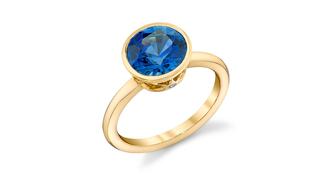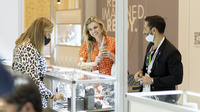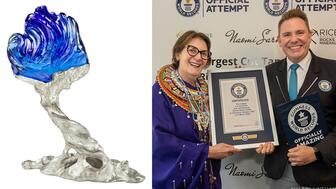It’s ultra-feminine and filled with gold, pearls, and soft pastels.
Tiffany Got Political; Should You?
Tiffany & Co. spoke out for action against climate change this week, sparking debate both about its stance and the question: Is it bad for business to get political?
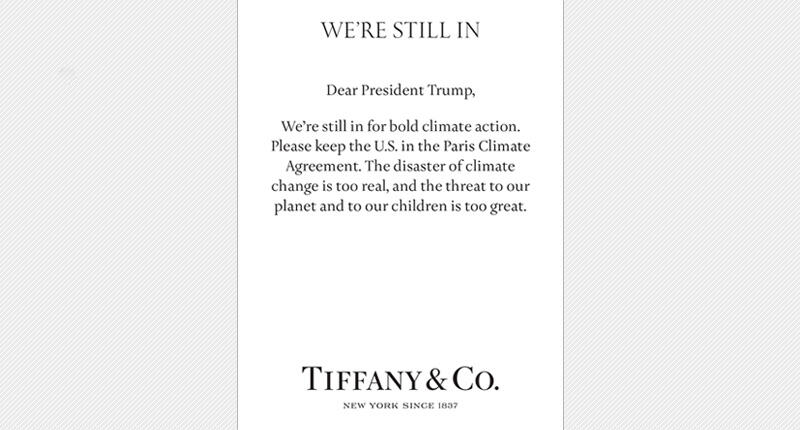
New York--Tiffany & Co. spoke out for action against climate change this week, sparking debate both about its stance and the question: Is it bad for business to get political?
The New York-based retailer had an advertisement in Tuesday’s New York Times asking President Donald J. Trump to keep the United States in the Paris Climate Agreement, the global pact to reduce greenhouse gas emissions from which the Trump administration is reportedly mulling a withdrawal.
The retailer also shared the message on Twitter, Facebook and Instagram on Tuesday morning, using black lettering against a backdrop in its signature robin’s egg blue.
As of Wednesday afternoon, the post on Facebook had more than 19,000 reactions, more than 2,000 shares and nearly 600 comments, many of which did not take issue with Tiffany’s stance but with a company that sells jewelry wading into politics.
As one user wrote: “Any responsible CEO who takes into consideration the value of their stock and a responsibility to their stockholders should never express, nor allow anyone to express, in the name of the company any sort of political opinion ever. This is not a statement of disagreement, it’s just a statement of fact. Keep business and politics separate.”
So, did Tiffany make a mistake in addressing the president and taking a position on climate change?
And is the separation of business and politics advice that all businesses, including independent jewelers, should take?
“I don’t think it’s smart for anyone to get political these days. I would not do it.” --Andrea Hansen, Luxe IntelligenceAndrea Hansen, president of Luxe Intelligence, which works on branding and business development with companies in jewelry, said while Tiffany endured some backlash for its ad, there was little risk in the company’s decision.
Environmental protection is an issue about which the retailer already has been vocal.
Tiffany was one of the most outspoken opponents of the proposed Pebble Mine in Alaska because of its potential impact on the surrounding ecosystem. The jeweler took out an ad in the Times addressing that issue and even sponsored a screening of the documentary about the project, “Red Gold,” in New York back in 2008.
Also, Hansen said, Tiffany is likely to find widespread support for its stance on climate change outside the United States.
“I think they are in a very safe place,” she said. “That they picked this one issue to be political, I feel
But that doesn’t mean that getting political is a good move for other players in the jewelry industry.
“I don’t think it’s smart for anyone to get political these days. I would not do it,” Hansen said, adding that by “anyone” she means brands, jewelry designers and, especially, retailers.
“The country is 50/50, basically, and it’s not smart to take the risk of losing clients when business is already so difficult.”
Bill Gullan, president of Philadelphia-based branding agency Finch Brands, agrees with Hansen on both points--that Tiffany was not taking a big risk with its climate change ad and that retailers, particularly small, independently-owned jewelry stores, should generally avoid injecting politics into their business.
“It’s like [talking about] politics and religion and sex at the dinner table. You really need some restraint here, I think,” he said.
But what if the business owner feels compelled to speak out on an issue because they believe it’s more about speaking up for what’s right than it is about politics?
There were commenters on the Tiffany Facebook post who noted as much about the company’s climate change ad, with one person writing: “Good on you (Tiffany) for taking a stance and expressing it … I don’t think people actually understand that speaking up for climate action is important and it is beyond a mere political stand. It affects everyone. It’s about the future of our home.”
Gullan said he gives his clients two pieces of advice about taking a political stance.
Number one, they should ask themselves: Does the position you’re considering taking map very closely with the values and belief system of your customer base?
Hansen gave this same advice to National Jeweler on Wednesday, reiterating what she said when commenting on Spicer-Greene’s conversation-starting billboard back in March--know your audience.
Gullan said the number two question to ask is: Do you, the brand, have credibility to speak on the issue?
He draws on two commercials that aired during this year’s Super Bowl to illustrate the concept of credibility.
Airbnb aired an ad that was a montage of people of different races, religions, genders and ages that sent a message of acceptance and tolerance. Gullan said as a company that promotes global travel and its clients immersing themselves in different cultures, this was a fine message for Airbnb to send.
Audi’s commercial, meanwhile, expressed its support for equal pay for equal work and was roundly criticized. It’s a message that seemingly came out of nowhere for the car company, a company, Gullan pointed out, that does not have a single woman on its board.
“Go for it, speak your truth, do you, but understand there are risks in terms of how your customers feel and react,” he said.
“Brands needs to be careful. There’s a lot of raw nerves and live wires about this stuff.”
The Latest

Emily Highet Morgan and Emily Bennett have joined the agency’s team.
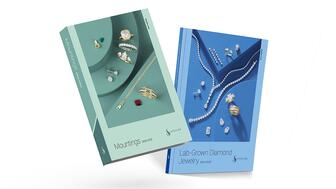
Its updated book for mountings is also now available.

With Ho Brothers, you can unlock your brand's true potential and offer customers the personalized jewelry experiences they desire.

She has been with the organization since 2010, most recently serving as its chief officer of PR and industry relations.


Joyce’s Jewelry sued the bank after cybercriminals drained its accounts of nearly $1.6 million through a series of wire transfers.

He is remembered by loved ones for his loyalty, integrity, and kindness.
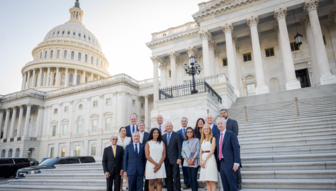
For over 30 years, JA has advocated for the industry, fought against harmful legislation and backed measures that help jewelry businesses.

Hosted by Freeman’s | Hindman, the sale will take place May 7-8.
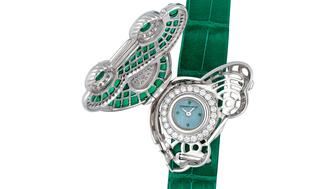
The auction house said all 24 timepieces offered in its underground sale of rare and avant-garde watches quickly found buyers.

From lab-grown diamonds and AI to the inevitable Taylor Swift mention, here are some of Conclave’s most intriguing educational offerings.

From cybersecurity liability to trade show coverage, insurance experts share tips on how to build the right policy.
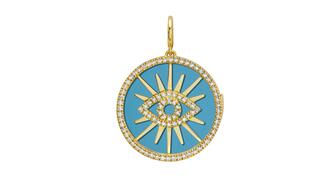
The charm is a modern rendition of the evil eye amulet that has been worn for thousands of years.

Ahead of its trade show next month, TJS awarded free registration and accommodations to one jewelry professional and three students.

Members can still sell lab-grown stones, it said, but only natural gems are allowed on the show floor.

He is remembered for his charisma, passion, integrity, kindness, and wit.

The retailer also appointed two new board members, avoiding a proxy fight from a potential buyer.

The bridal collection consists of 35 engagement rings and seven wedding bands.
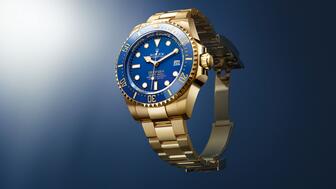
The crown introduced a dozen timepieces in Geneva, including a heavy metal version of its deep-sea divers’ watch.
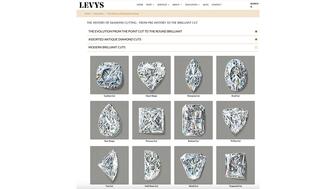
The family-owned jeweler has a new education section on its website dedicated to the history of diamond cutting.
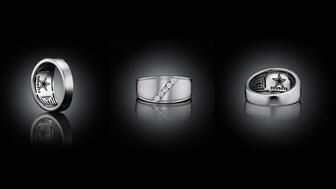
The limited-edition men’s rings can be customized with one of 12 team logos.

There is a willingness to comply with new government-mandated regulations, with an insistence that they should be practical and realistic.

The program, now live in Europe, will roll out to the U.S. this summer.

Colored gemstones and signed jewels are the focus of its upcoming Geneva sale.
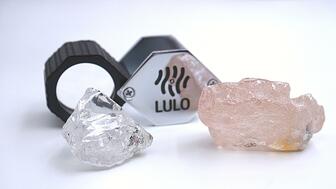
Stuart Brown, who was De Beers’ CFO and interim CEO, is now Lucapa’s independent non-executive chairman.

The point-of-sale software can now prompt customers to round up their credit card purchases as a donation to Jewelers for Children.
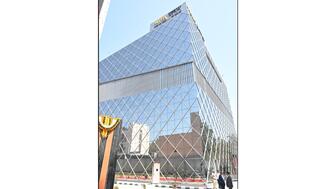
The zone’s modernization will enhance and increase India’s jewelry manufacturing capabilities while aiding small and mid-sized businesses.

